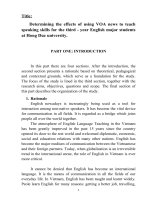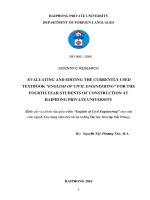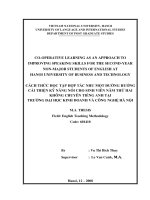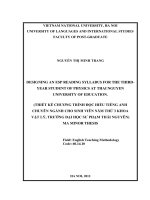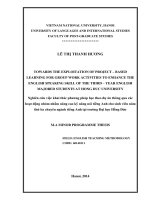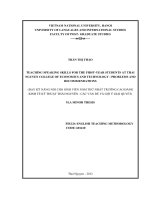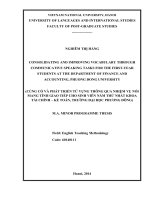FACTORS AFFECTING ENGLISH SPEAKING COMPETENCE FOR THE FIRST YEAR ENGLISH MAJORED STUDENTS AT THUONG MAI UNIVERSITY
Bạn đang xem bản rút gọn của tài liệu. Xem và tải ngay bản đầy đủ của tài liệu tại đây (370.44 KB, 50 trang )
THUONGMAI UNIVERSITY
ENGLISH FACULTY
------
GRADUATION PAPER
FACTORS AFFECTING ENGLISH SPEAKING COMPETENCE FOR THE
FIRST-YEAR ENGLISH-MAJORED STUDENTS AT THUONG MAI
UNIVERSITY
Supervisor: Pham Thi Phuong, M.A.
Student: Doan Thi Hoang Yen
Class: K50N3
Student’s number: 14D170199
Hanoi - 2018
HÀ NỘI - 2016
ABSTRACT
Nowadays, English plays an important role in Vietnam, especially during the
period of international and global integration. Because of desiring a high-paid job
and good job opportunity, every student always makes effort to improve and
enhance their English in four skills including listening skill, speaking skill, reading
skill and writing skill. However, the English speaking comprehension of students
during and after graduation are still poor, and many graduates are not thoroughly
equipped with necessary language skills. As a result, more than half of the graduates
do not meet enough requirements of recruiters.
Spoken language production is often considered one of the most difficult aspects of
language learning (Brown & Yule, 1983). Students have a number of difficulties in
speaking English. To find out the common obstacle for learning speaking, this study
was conducted for first-year English-majored students at Thuong Mai University,
Ha Noi, Vietnam to find out the factors affecting speaking English competence. It is
a combination of both qualitative and quatitative methods with questionnaires and
interviews. Based on the research findings, some recommendations and suggestions
for not only the students to improve English speaking skill but also the teachers to
teach effectively were made. The study was expected to help students know more
about the difficulties and improve their performance in speaking English.
2
ACKNOWLEDGEMENTS
I would like to express my sincere gratitude to my supervisor Mrs. Pham Thi
Phuong, who helped, supported and encouraged me enthusiastically while I
conducted this study. Without her helpful comments, valuable advice and
considerable assistance, this study could not have been completed.
Moreover,would like to thank the teachers at English Faculty of Thuong Mai
University for providing me best conditions to fulfill my study. I also want to
express my appreciation to the first-year English-majored students at TMU who
helped me to conduct collect data for the study to make my study more detailed.
Last but not least, I would especially thank my family, my close friends and
my classmates who supported and encouraged me to conduct this study.
Ha Noi, 10th April, 2018
Student
Doan Thi Hoang Yen
3
TABLE OF CONTENTS
ABSTRACT............................................................................................................. ii
ACKNOWLEDGEMENTS...................................................................................iii
TABLE OF CONTENTS.......................................................................................iv
LIST OF ABBREVIATIONS.................................................................................vi
LIST OF TABLES AND FIGURES.....................................................................vii
CHAPTER 1: OVERVIEW OF THE STUDY......................................................1
1.1. Rationale............................................................................................................1
1.2. Previous studies..................................................................................................2
1.3. Aims of the study................................................................................................3
1.4. Research subjects...............................................................................................3
1.5. Scope of the study..............................................................................................4
1.6. Research methodology.......................................................................................4
1.7. Organization of the study...................................................................................4
CHAPTER 2: LITERATURE REVIEW...............................................................6
2.1. Definition of speaking........................................................................................6
2.1.1. Definition of speaking.....................................................................................6
2.1.2. Definition of competence for speaking............................................................6
2.1.3. Components of speaking process.....................................................................7
2.2. Types of speaking...............................................................................................7
2.2.1. Interactive speaking.........................................................................................8
2.2.2. Partially interactive speaking...........................................................................8
2.2.3. Non-interactive speaking.................................................................................8
2.3. Preparation before speaking...............................................................................8
2.3.1. Be a good listener............................................................................................9
2.3.2. Structure speaking process in mind.................................................................9
2.3.3. Manner and attitude.........................................................................................9
2.3.4. Micro-skill.......................................................................................................9
2.4. Factors affecting to speaking process...............................................................10
2.4.1. Listening ability.............................................................................................10
2.4.2. Pronunciation and accent...............................................................................11
4
2.4.3. Vocabulary.....................................................................................................11
2.4.4. Grammar........................................................................................................12
2.4.5. Learning environment...................................................................................13
2.4.6. Emotional factors...........................................................................................15
2.5. Summary...........................................................................................................17
CHAPTER 3: RESEARCH FINDINGS..............................................................18
3.1. Procedures for conducting questionnaire survey and interview........................18
3.1.1. Procedure for conducting questionnaire survey.............................................18
3.1.2. Procedure for conducting interviewing..........................................................18
3.2. Analysis of research findings............................................................................19
3.2.1. Students’s real situation of learning English..................................................19
3.2.2. Students's attitudes toward English speaking competence.............................20
3.2.3. Student's problem in learning speaking English process...............................23
3.2.4. Difficulties affecting English speaking comprehension of students...............25
3.2.5. Activities for improving English speaking skill of students...........................28
3.3. Main findings and discussion...........................................................................29
CHAPTER 4: RECOMMENDATIONS AND SUGGESTIONS.......................32
4.1. For students......................................................................................................32
4.2. For teachers......................................................................................................34
CONCLUSION......................................................................................................36
REFERENCES
APPENDIX
5
LIST OF ABBREVIATIONS
Order
numbe
Abbreviations English Meaning
Vietnamese Meaning
r
1
TMU
Thuong Mai University
Trường đại học Thương
Question
Questionnaire survey
Mại
Câu hỏi
Bảng câu hỏi khảo sát
2
3
Q.
QS
6
LIST OF TABLES AND FIGURES
TABLES
Table 3.1: The questionnaire results of students' years on learning English........................20
Table 3.2: Figures for strengths of students in speaking English skill.................................23
Table 3.3: Figures for weaknesses of students in speaking English skill.............................24
Table 3.4. Figures for listening comprehension of students at class....................................26
Table 3.5. Figures for activities of students in improving speaking English.......................29
CHARTS
Chart 3.1: Students' assessment of learning speaking English skill.....................................21
Chart 3.2: Numbers of students who determine the degree of importance' factors affecting
speaking English skill..........................................................................................................22
Chart 3.3: Time for self-study speaking English a day at home of students........................25
Chart 3.4. The percentage of students's mood when speaking in English with four kinds of
listeners................................................................................................................................27
7
CHAPTER 1: OVERVIEW OF THE STUDY
1.1. Rationale
There are many reasons why the author chose this topic for studying:
First, a great number of non-English speakers as well as native English speakers use
English as an important standard of international communication in every part of
the world. English is recognized as the international language which people in many
countries use to communicate with each other. Listening and speaking skills are
more and more essential to communicate with foreigners. As a consequence, it is
necessary for Vietnamese people to be able to use English effectively. Without a
doubt, the ability to communicate in English in real life situations will remain
essential, and students are expected to be able to communicate in the English
language. The purpose of learning English is, thus, to communicate in English
efficiently in the real world.
Second, speaking English skill provides learners or students with several distinct
advantages. It is the capacity to express one's thoughts, opinions and feelings clearly
and skillfully in the form of words put together in a meaningful way. It also brings
back good opportunities for Vietnamese students to work in an international
environment.
The last but not the least, speaking plays a more important role than other skills in
overall communication. Spoken language production is often considered as one of
the most difficult aspects of language learning. Students have a number of
challenges in speaking English. However, they do not know which learning method
is appropriate to follow, the efficiency and the result are not clear.
With the three main reasons presented above, it is reasonable to say that English
speaking is an important skill that learner needs to improve besides their mother
tongue. However, there are many problems that learners have to encounter when
learning and many factors which affect speaking English competence. Therefore,
the author conducted this study with the objective of first-year English-majored
1
students at Thuong Mai University, helping them first improve their speaking
English skill.
1.2. Previous studies
There are many studies about factors affecting competence for speaking
English. However, the author would like to study whether those are suitable for the
first-year English-majored students at Thuong Mai University or not.
The research conducted by Tanveer (2007) is a widely-known one which examined
the factors caused anxiety for learners in learning speaking ability and the impact
of anxiety on target language communication. The obtained results indicated that
learners’ feeling of stress and anxiety stop their language learning and performance
abilities. The researcher emphasized that the high anxiety lowers the learners’
speaking performance.
Ali Dincer & Savas Yesilyurt (2013) in their study Pre-Service English Teachers’
Beliefs on Speaking Skills Based on Motivational Orientations. They showed that
“Students’ ideas about the importance of speaking skills among the four language
skills are diverse; this diversity is associated with the students’ motivational
orientations and students’ feeling competent/ incompetent in speaking. Also,
students’ self-assessment about their speaking ability was generally negative and
they expressed themselves as incompetent speakers. Few of them said that,
"compared to other students, they had a better position both in participating in
speaking activities and speaking English", (p.25).
Lukitasari (2008) conducted a study focusing on the students’ strategies in
overcoming speaking problems in speaking class. The population of her study was
the first semester students of Muhammadiyah University of Malang in Indonesia.
The findings revealed that students often feel not confident enough when speaking
or presenting before class because they are shy and afraid of their wrong or bad
pronunciation.
Feyten (1991) conducted a study to examine whether there is a relationship between
2
listening ability and speaking ability. The results show that there is a significant
relationship between listening and speaking, they support each other and affect
directedly each other because communication need both listeners and speakers.
Boonkit (2010) carried out a study on the factors increasing the development of
learners’ speaking skill. The results represented that the use of appropriate activities
for speaking skill can be a good strategy to decrease speakers’ anxiety. The results
also revealed that the freedom of topic choice urged the participants to feel
comfortable, persuaded to speak English, and increased the speaking confidence
among EFL learners.
1.3. Aims of the study
Realizing the importance of speaking English skill besides natural language
and the difficulties that first-year students have to face when learning speaking, the
researcher decided to do research to find out which factors affecting to their English
competence. The researcher would like to give some suggestions and
recommendations to help them improve their speaking comprehension and develop
themselves.
The study was carried out in order to answer and solve some following
questions:
1. What are the problems that the first-year English-majored students at Thuong
Mai University encounter when they learn to speak English?
2. What are the factors that affect their speaking performance?
3. What are effective methods of studying English, especially speaking skill?
4. What do first-year English-majored students have to do to improve speaking
English skill?
1.4. Research subjects
3
In this study, the researcher would concentrate on making inquiries about the
challenges which first-year English-majored students at TMU deal with when they
speaking English and discover factors affecting competence for speaking English.
Moreover, the author would examine related aspects of speaking performance in
order to support first-year English-majored students at TMU to learn English,
especially speaking skill and make them feel comfortable and confident instead of
being shy or afraid of speaking wrong.
1.5. Scope of the study
This study was conducted with first-year English-majored students at Thuong
Mai University, which includes English faculty and some teachers who teach
English subjects with many experiences.
1.6. Research methodology
The methods the author choosed was a combination of the two following
ones: Questionaire survey and Interview. They have some following features in
common:
- Data Collection: First-year English-majored students at TMU
- Samples of the study: Select randomly some students and teachers to create a
sample frame and results for the study.
The questionnaire survey and interview questions are attached in Appendix. The
questionnaire survey was designed for first-year English-majored TMU students
only and the interview was conducted with teachers at language practice subject at
Thuongmai University too.
These domains may reflect the factors that negatively affect speaking skills at
Thuong Mai University for first-year English-majored students.
1.7. Organization of the study
4
This study was divided into four main chapters including chapter 1, chapter
2, chapter 3 and chapter 4 named "Overview of the study", "Literature review",
"Research findings" and "Recommendations and suggestions" respectively.
Depending on the content and idea of each main part, there are other small parts
which support for the main one.
In Chapter 1, there are seven small parts, including "Rationale", "Previous studies",
"Aims of the study", "Research subjects", "Scope of the study", "Research
methodology", and "Organization of the study." It shows some general information
about the study so that readers could have an overview of the entire study.
In Chapter 2, the author prestents some theories of the content of the study and
other related sides.
In Chapter 3, the author shows the research findings according to questionnaire
survey and interview.
In Chapter 4, the author gives some recommendations and suggestions of how to
help students improve their English speaking competence.
5
CHAPTER 2: LITERATURE REVIEW
2.1. Definition of speaking
2.1.1. Definition of speaking
According to Oxford Dictionaries, speaking is defined as the action of conveying
information or expressing one's thoughts and feelings in spoken language. It is also
the activity of delivering speeches or lectures.
Speaking is basically one of the four skills in learning foreign language besides
listening, reading, and writing. David Nunan, Guralnik, loc. cit., p. 39 showed that
"To most people, mastering the speaking skill is the most important aspect of
learning a foreign or second language and success is measured in terms of ability to
carry out a conversation in the language."
Literally, speaking means to say words for purpose of talking about something,
having a conversation with somebody; addressing somebody in word. While speech
means the power of action of speaking a manner or way of speaking.
Furthermore, speaking is the term that the writer uses for verbal communication
between people (B.F.Skinner 1948, p.151). When two people are engaged in talking
to each other, the writer is sure that they are doing communication. Communication
between people is an extremely complex and changing phenomenon. There are
certain generalizations that we can make about the majority of communicative
events and these have particular relevance for the learning and teaching process.
2.1.2. Definition of competence for speaking
In other words, competence for speaking is found out that the skills which give us
ability to communicate attractively and effectively. An individual is supposed to be
a good speaker when he/she conveys his/her message into thoughtful manner or
convincing manner.
6
In addition, it is understood that the capacity of flexible combining words makes
speech or speaking process become more easy, interesting and natural.
2.1.3. Components of speaking process
Pronunciation:
It includes some features: vowels, consonants, stress, intonation, accent.
Grammatical range and accuracy
It is a linguistic category, which is generally defined by the syntactic or
morphological aspects, for example using sentence structure and tenses.
Vocabulary and collocation:
It decides and make the sentence sense, it maintains all the information of speaking
process.
Fluency and coherence:
It is the flow of speech, which is using words with no cognitive or mental effort. It
is having mastered word recognition skills to the point of over learning. These
factors make the speech or speaking process be more natural and do not make
others feel uncomfortable when listening.
Comprehension:
It refers to understanding thoroughly the whole aspect of message conveyed in the
conversations; in this case comprehensibility focuses on the students’ understanding
of conversation.
2.2. Types of speaking
Speaking skill is the productive oral mode of communication. Like other
skills, t is more complicated than it seems at first and invloves more factors than
just pronouncing words. It depends on the way you approach speaking situations to
distinguish types of speaking (Alderson, J. C. Krahnke, K. J. & Standfield, C. W.
7
(Eds.), 1987. Reviews of English language proficiency tests. Washington, DC:
TESOL.)
Speakers hope to accomplish general and specific purposes when they
communicate. Each kind is structured with gernal purposes such as: to inform, to
persuade, to entertain. When a speaker seeks to inform, they want the audience to
leave the speech knowing more than they knew beforehand. Speakers may want to
explain an idea or process, share new information, or show how to do something.
When a speaker aims to persuade an audience, they want them to adopt a new
position or belief, to change their minds, or to be moved to action. Persuasion calls
a speaker to advocate one position among others that are possible and be willing to
defend it against challenges. It sometimes requires different rules and structures.
Based on audience, It is divided into three kinds of speaking situations which is
seen in our daily life:
2.2.1. Interactive speaking
It includes face-to-face conversations and telephone calls or direct dialogue. In this
situation, there are both speaker and listener. The listeners have a chance to ask for
clarification, repetition, questions, demonstrations or even debate from their
conversation partners.
2.2.2. Partially interactive speaking
It happens when giving a speech to live audience, where the convention is that
audience does not interrupt the speech without permission. It may be some
situations such as: meeting, presentation, lecture.
2.2.3. Non-interactive speaking
Few speaking situations may be totally non-interactive, such as when recording a
speed for a radio broadcast, monologue.
2.3. Preparation before speaking
8
Depending on kinds of speaking situation above, speakers also need to prepare
carefully before speaking in order that the speaking process is smooth. Good
speaker have ability to analyze and absort the information given to them, assess it
fast and to make decision and communicate with others.
2.3.1. Be a good listener
The key factor to become a good speaker who can think on the spot and respond
intelligently is to be an active listener. Harmer, J. & Amold, J. (1978). Advanced
speaking skills. Harlow: Longman
This means that the speaker need to pay attention to listen carefully and observe
reaction of listener, to be concerned with the words, tone, emotion and logic behind
what the other one is speaking.
2.3.2. Structure speaking process in mind
It means that you have to think carefully before you speak. Depending on your time,
You shoud spend one minute on organising ideas and thoughts quickly. You should
also structure new information related to your topic so that you can respond with
incase audiece wants to ask you for more information.
The basic structure of any speech invloves: opening, body and conclusion. Besides,
you need to prepare some topic vocabularies, grammar or suitable tenses. It is very
useful in delivering speeches and especially for spwkaing in special situations.
Be thoughtful before speaking plays an important role in adding value in terms of
communicating speaker's thought, ideas and feelings.
2.3.3. Manner and attitude
In any cases, speakers always do not lose control and be in refined manner and
attitude. Let's show or express the suitable feeling in situation. For example, if you
are at a meeting, you should show serious and enthusiastic.
2.3.4. Micro-skill
9
If you are not a foreigner, here are some micro-skill involved in speaking that you
need to note:
The speaker need to pronounce clearly distinctive sounds of the language so that
listener can distinguíh them, especially tonal distinctions. You should try to use the
correct forms of words, tenses, cases and gender.
Moreover, unless you pay much attention to use vocabulary appropriately and put
words together in the correct order, listeners will find it hard to understand what you
are speaking.
2.4. Factors affecting to speaking process
2.4.1. Listening ability
Listening skill plays an extremely important part in the development of speaking
ability. Listening skills have been a great concern for language learners since it is
regarded as one of the prior conditions of oral output in language learning process.
Listening comprehension is a very basic skill that one must have to become a good
English speaker.
Speaking skills cannot be developed unless we develop listening skills. Listeners
must understand what is said to them to have a successful conversation. Every
conversation can last or not, it depends on the ability of both speaker and listener to
maintain the content of interaction. When one person speaks, the other responds
through attending by means of the listening process. Unless one can understand or
listen which others are saying, the conservation will not continue.
The most common mistake that non-native English speakers often make is they only
concentrate their time and effort on improving their speaking English skill without
practicing their English listening skill first. As a result, many non-native speakers
cannot understand the questions or things others saying. Foreigners often speak so
fast and some can find it hard to listen their accent. If you cannot hear, you will not
how to answer or give an appropriate answer.
2.4.2. Pronunciation and accent
10
The importance of pronunciation in communication cannot be denied. In fact, it is
as essential as grammar and vocabulary. Yet, the evidence of mother tongue
influence on English is very obvious. This manifests in the form of incorrect
pronunciation.
According to Wikipedia, pronunciation is the way in which a word or a language is
spoken. This may refer to generally agreed-upon sequences of sounds used in
speaking a given word or language in a specific correct pronunciation, or simply the
way a particular individual speaks a word or language.
Accent is nearly alike to pronunciation, it is a distinctive mode of pronunciation of a
language, especially one associated with a particular nation, locality, or social class.
For example, it is very easy to say if someone is from Australia, America or British
even if they all speak English because accent usually reflect the place where people
come from.
The two components affect directly to speaking skill because the speakers need to
know how to pronounce a word correctly before speaking a full sentence.
Foreigners have difficulties in listening non-native English speaker as they often
pronounce wrong.
The fact that people often are influenced their own pronunciation and accent from
the community where they interact. For students, moreover, if the teacher has a nonnative accent, it will affect students’ pronunciation as well. Pronunciation and
accent are like the foundation that you need to be firm, you have to get used to
using English fluently as your mother tongue if you want to be good at English.
2.4.3. Vocabulary
It is acceptable that vocabulary is indispensable in producing speech with
appropriate meanings as well as in generating syntactic, morphological, and
phonological structures in speaking process.
Vocabulary is considered as the key to communication with others. For a large
majority of English learners, the ultimate goal of studying is to be able to
communicate in English. If you do not wish to lean completely on non-verbal skills,
11
mastering vocabulary is not just important, but crucial in a foreign English
environment.
Improving your vocabulary has a postitive impact on your capacity of building up
your language proficiency in general and speaking English skill in particular. A
variety of vocabularies make the skill of speaking English easier to perform. When
your working memory is not loaded with hesitation about the correct spelling or
pronunciation and contextual use of the words, you can focus completely on higher
level aspects of language such as using precise sentence structures, grammar and
appropriate expressions for the type of conversation which is going on.
In addition, vocabulary will create the content of the conversation and by
combining the words together. However, besides using vocabulary, English speakers
need skills relating to grammar, using suitable structures, form of words and
appropriate tense to make the sentence sense. Therefore, before becoming a good
English speaker, you should focus on improving and expanding your variety of
vocabularies. In other words, vocabulary also shows your topical knowledge of
relevant topical information; it also enables speakers to use language with reference
to the foreigners.
2.4.4. Grammar
Using the correct grammatical structure speaking English play an indispensable role
in avoiding misunderstandings, and in supporting others understand you easily. If
your English is full of mistakes, you will slow down communication and
conversations, and find it harder to express your ideas or thoughts clearly and
concisely.
Moreover, grammar is very important because it may help enhance accuracy in
English. Marcel (1853) - p.424 highlights this point in his book. He clarifies how
grammar develops accuracy in communication as "it forms the mind to habits of
order and clearness; concurrently with logic and rhetoric, it accustoms learners to
accuracy of language, and hence, to accuracy of thinking". This means grammar
12
rules can help learners develop a habit of thinking logically and clearly. Therefore,
after studying grammar, they will become more accurate when using language.
Besides, an appropriate usage of grammar is a sign of respect, both for speakers and
listeners. For speakers, speaking in exact way means they take time to polish
themselves with a good impression from the listeners. A person with a poor
grammar can let native listeners have negative impression on the first-time
communication. For listeners, a proper usage of grammar shows that their thought is
concerned. Speakers do not want them to waste time trying to figure out or try to
find out what they are saying.
However, the development of social network and technology, people become
grammatically lazier. They tend to use sentences that are as simple as possible.
Moreover, they also use fragments of sentences and they consider grammar as
unnecessary as long as what they say is understandable. Nevertheless, this causes
misunderstanding among listeners, especially for non-native ones. Speakers should
pay more attention to grammar when they learning speaking English.
2.4.5. Learning environment
Learning and living environment play an important part in deciding how
good or bad the learner at speaking English.
Teacher-related factors
In many universities and schools, teachers do not let students practice English
speaking through techniques such as pairs or group discussion, dialogues, role-play,
debating or presentations.
Also, they do not let students learn speaking through listening to the records on the
radio or video and present the report back to the class so that students can improve
their English listening comprehension and fluency. There are some cases that
teachers often require students to ask for feedback or comments but, they do not
present some pronunciation points to help students to develop their English fluency.
13
Therefore, the knowledge which students are learned at school are not practical and
effective enough to put into practice.
Moreover, some teachers have poor speaking activities at class, give less time to
different speaking exercises. As a result, students feel bored when English lessons
and they have no motivation to learn.
Besides, many students expect their teacher to give them feedback about their
performance at class. However, the teacher should know how to give comments
positively, to motivate their students without let them feel confused or too bad to try
their best.
In conclusion, if teachers use of the techniques, strategies and entertainment
activities on teaching, students will show their interest and pay more attention to
lessons. Furthermore, careful selection of full-qualified English teachers with good
English language command need to be done.
Classmate-related factors
In any classes, there are always both strong and weak learners and each of them has
different abilities and knowledge. The strong and quick students are often seen to be
dominating and overtaking the slow and weak students. The weaker students do not
get opportunity to show or express ideas and thought because of the presence of
good ones. This make them feel insecure about themselves and they hesitate before
what they want to speak.
Therefore, it is very essential to divide class into different groups with different
levels so that students have the best condition of learning. Teachers also should
build up student's confidence by giving some simple and easy tasks for the weak
group to encourage them to participate in class activities. Teachers also need be
aware that the learners’ acquisition of given skills is on their shoulder; hence, they
should take full responsibility to monitor, facilitate, and supervise their students’
learning. On the other hand, students need to be made aware of the responsibility
they have on their learning. They should be told that their learning development is
their own duty so that they should take full responsibility to monitor their own
learning.
14
2.4.6. Emotional factors
Self-confidence and attitude
A real good speaker is one who is able to be confident in front of listeners and to
create impression. No one would take you seriously unless you believe in yourself
because confidence relflects the way you deliver your speaking content, the way
you handle the audience, the way you show your body language and eye-contact.
The speaker should be comfortable when standing in front of a wide range of
audience instead of being confused or stressful.
Hanton, Mellalieu and Hall (2003) reveal how low self-confidence level affects
performance and they extract a sentence form one of the participants’ response to
their interview as: “If self-confidence is low, then the feelings start to edge towards
the negative which would be very bad for performance.” (p. 481). Another
extraction in the same study reveals how effective the high level of self- con dence
is: “High self-confidence increases the intensity of thoughts and feelings that you
can control... If you’re confident you stay in control of your thoughts...” (p. 481).
In addition, postive attitude also play an indispensable part when speaking. Students
often have tend to evade when being asked to address to speak to a group of over 50
individuals, they definitely not like the idea and come up with several excuses to
avoid the same. The problem is really nowhere but in our attitude, the way we see
things. Professionally it always helps to look at the brighter sides of things.
Remember, cribbing leads to no solution.
An individual who accepts challenges with a smile is the one who climbs the
success ladder within the shortest possible time frame. You should remember not to
make an issue of every small thing. Speaker's mission is to ensure that his/her
listeners has understood what are discussed at the session. Positive attitude helps
you concentrate and also keep calm. Speakers should keep a smile on their face and
connect with listeners. Those with a negative attitude generally find it difficult to
adjust with listeners. Instead, speakers should learn to accept mistakes and not feel
15
bad if someone points out the mistake. Positive attitude also helps you deal with
criticism and face critics.
Motivation
Motivation shows how successful language learners are, especially when speaking
learning. Motivation is the answer that researchers and teachers provide when
regarding to efficient language learning. Motivation help student determine the
extent of active, personal involvement in learning speaking Oxford & Shearin,
1994, as cited in Huang 2007. It is shown that motivation directly influences how
often students use strategies of speaking, how much students interact with native
speakers and how long they persevere and maintain speaking skills.
Although not everyone who is motivated to learn manages to succeed, most people
who do achieve a high level of success also turn out to be very strongly motivated.
Learning another language is a long, full of difficulties and challenges process.
Students who want to improve their speaking English are required to try their best
and spend as much time as possible on practicing English fluently. In reality,
students tend to have a variety of reasons why they want to learn, and different
aspects motivate them at different times.
However, learner's motivation can change, which depends on each stage of times. it
focuses on learners' abilities to envision an ideal future for themselves as positive,
competent and successful second language speakers. Therefore, speaking learners
should keep and maintain not only their mood but also motivation to get the best
results of learning English process.
Anxiety
Phillips and Endler, 1982 supposed that "Anxiety is an unpleasant feeling which
involves apprehension, distress, embarrassment, surprise and dread and it is more
than certain that if not all students may be anxious during classes, they are generally
anxious over examinations."
16
Anxiety has been considered a verry nagative factor in learning a foreign language,
especially in learrning to speak English. In Horwitz et al. (1986:126) words,
"anxiety is a major obstacle to overcome in learning to speak another language."
Speaking is is a promblematic because the spontaneity allows the speaker no
preparation time in which to moniter and correct what he or she wants to say, thus
the risk of being wrong in an oral class is high (Horwitz & Young 1991). Anxiety is,
therefore, considered a major obstacle to developing language skills, and
particluarly speaking skills.
Learning English or any second language is a systematic complex process, which
requires the knowledge of language structures, vocabulary, and pronunciation as
well as corresponding skills. That is the reason why many learners experience a
deep anxiety in their efforts to master a new language. From this point of view a
foreign language class may be more anxiety-provoking than any other course for
many students (MacIntyre, 1995; MacIntyre & Gardner, 1991a; Liu, 2007; Ohata,
2005).
In learning process, students tend to make more mistakes when thet are nervous.
The more mistakes they make, the more nervous they will be, and the less likely
they are to perform well at speaking skills. It is cetain that anxiety can create the
difference between success and failure in language learning process.
2.5. Summary
There are many factors which affect to competence for speaking English skill, both
positive and negative factors. Learning second language is a difficul process, which
requires learners many features named above: listening ability, pronunciation and
accent, vocabulary, grammar, learning environment, emotional factors. In order to
get best results, you are always patient and try your best, make a detailed plan of
learning together with suitable methods.
CHAPTER 3: RESEARCH FINDINGS
17
In this chapter, the author gives the full analysis of data collected through the
questionnaire survey and interview for teachers and students on the factors affecting
English speaking competence for the first-year English-majored students at TMU. It
shows an attempt to answer the four research questions posed at the beginning of
the study.
3.1. Procedures for conducting questionnaire survey and interview
3.1.1. Procedure for conducting questionnaire survey
The questionnaire survey in English was designed (attached in Appendix); it
consists of 12 questions which are specified in the three main parts. Besides 12
questions, there are extra three questions designed for collecting general
information of students; questions of part I aim at finding out personal views and
opinion on learning speaking comprehension; questions of part II related to
difficulties when learning speaking English and questions from part III mainly seek
for the activities and techniques of learning in speaking English. Fifty sheets of
questionnaire survey were delivered randomly to the first-year English-majored
students at Thuong Mai University at their break time.
To guarantee the reliability and the validity of the samples, before asking the
learners to do the questionnaire survey, the researcher briefly stated the purpose and
significance of the study and clarified any misunderstanding about the survey
questions. In addition, the written instructions on the handout, oral the instructions
and explanations in Vietnamese were presented to avoid any ambiguity. Therefore,
the questionnaire survey for students was delivered to 50 English-majored students
of K53 at TMU.
3.1.2. Procedure for conducting interviewing
The researcher first designed the interviewing question sheet (attached in
Appendix). Oral instructions and explanations were given in detail to the teachers
by
the
researcher
before
they
answered
the
question
to
avoid
any
misunderstandings. It was simultaneous conducted with the questionnaire survey.
18

